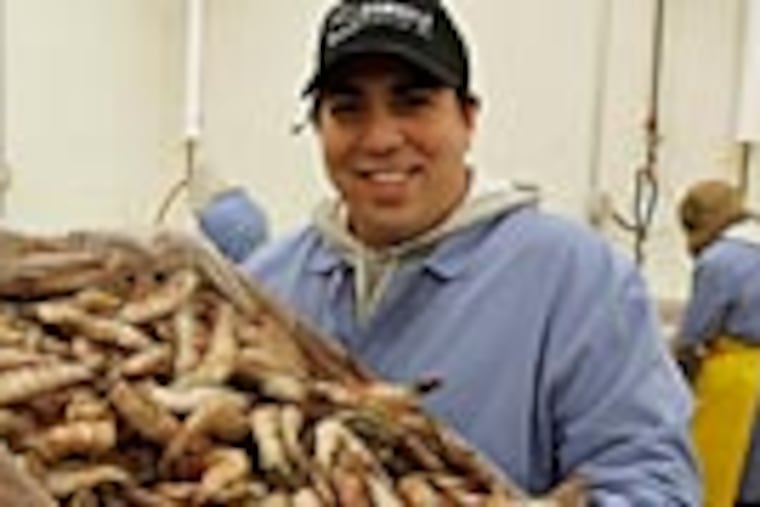Gulf oil spill driving up seafood prices
The oil spill in the Gulf of Mexico is driving seafood prices in the Philadelphia area skyward. The spike is affecting shrimp, crab, and crawfish - all products of the Gulf region - according to area chefs and seafood importers. Some of the increase eventually will be passed on to local diners.

The oil spill in the Gulf of Mexico is driving seafood prices in the Philadelphia area skyward.
The spike is affecting shrimp, crab, and crawfish - all products of the Gulf region - according to area chefs and seafood importers. Some of the increase eventually will be passed on to local diners.
More than that, they say, increased demand for fish from other regions, such as the mid-Atlantic, is raising prices on seafood from outside the Gulf.
The wholesale price of fluke, for instance, climbed to about $12.50 a pound from about $7.50 in about a week, according to Jonathan Adams, the chef at the Pub and Kitchen, at 20th and Lombard Streets.
A similar jump has been seen in the price of striped bass, which typically sells for $4.50 to $5 a pound but is now edging toward $6.50, according to Terence Feury, the chef at Fork, at Third and Market Streets.
Both fish come not from the Gulf, but from the Atlantic Ocean.
And consumers can expect things to get worse.
"There is a lot of panic," said Sam D'Angelo, owner of Samuels & Son, a Philadelphia fish wholesaler. "People don't know exactly what is going on. No one knows when this spill will be contained or whether it could drift into the Gulfstream or over into Texas waters."
The source of the panic is the growing spill that started April 20 with the explosion of a BP oil rig in the Gulf off the Louisiana coast. An estimated 200,000 gallons of crude oil have been gushing daily from the well. The total spill so far is estimated at more than 3.5 million gallons.
The spill has impacted fishing in the Gulf region, greatly reducing the supply of some seafood products.
"The two items that are through the roof and really tricky are crab and shrimp," Adams said. "Our purveyors are pulling out their hair. Some companies do have stock but are holding back because they don't want to run out of product."
D'Angelo said he had experienced the same phenomenon.
"We are seeing inventories slowly dissipate," he said. "We talked to someone who had recently had about 100 cases of each size shrimp in stock. Now, they are willing only to provide us 10 to 20 cases."
Prices have jumped a $1 per pound, in some instances, he said, with some sizes of shrimp in the $7 range.
Crab prices have only begun to rise, he said.
"Louisiana crab that was selling for $17 to $18 a pound is now going for $26, $27 a pound," Adams said. "If you are going to try to have a crab cake on your menu, it is going to kill you."
One result is that restaurants will turn to available fish from other regions, he said, driving those prices up as well.
Feury, the chef at Fork, anticipated the same thing.
"This going to basically shrink the supply and increase the demand elsewhere," he said. "I don't use much stuff from the Gulf, but I'm expecting prices elsewhere to increase 10, maybe 20 percent."
The rising prices for fish from outside the Gulf was particularly worrisome to Adams because he is overseeing the opening of the Diving Horse, a sister restaurant to the Pub and Kitchen, in Avalon, N.J.
The seafood-themed restaurant is due to open in three weeks and is expected to draw its menu from the mid-Atlantic.
"We are looking to Maryland, the Carolinas, New Jersey, of course," Adams said. "I think it is going to be good for the Jersey fishermen, crabbers, all of those guys, because they are going to be able to sell a lot more product. But it is going to be a problem for us because the prices will go up."
Diners will ultimately see some of that increase, but not all, according to both Adams and Feury.
"There is only so much we can charge," Feury said. "Our entrées are in the mid-$20s range now and there is only so much you can do.
"You wind up looking for other ways to make it up, more economical ways, making interesting pastas, making the most of your vegetables. You have to get to creative."